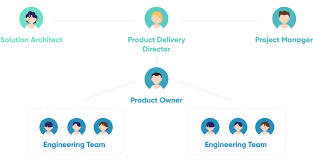The Role of a Software Engineer
A software engineer is a professional who applies the principles of software engineering to design, develop, maintain, test, and evaluate computer software. They are responsible for creating efficient and reliable software solutions that meet the needs of users and organizations.
Software engineers work closely with other team members, such as software developers, programmers, and project managers, to ensure that software projects are completed on time and within budget. They use their technical expertise to analyze user requirements, design software solutions, write code, and test software applications for bugs and performance issues.
Software engineers must have a strong understanding of programming languages, algorithms, data structures, and computer systems. They must also possess excellent problem-solving skills and attention to detail to identify and fix issues in complex software systems.
In addition to technical skills, software engineers must also have good communication skills to collaborate with team members and stakeholders effectively. They must be able to explain technical concepts in non-technical terms and work well in a team environment.
Overall, software engineers play a crucial role in the development of software applications that drive innovation and improve efficiency in various industries. Their expertise is essential for creating high-quality software products that meet the needs of users and help organizations achieve their goals.
Top 9 Frequently Asked Questions About Software Engineer 1
- What is the role of a software engineer?
- What skills are required to become a software engineer?
- What programming languages do software engineers use?
- How does a software engineer collaborate with other team members?
- What tools and technologies do software engineers commonly work with?
- What is the typical career path for a software engineer?
- How does a software engineer ensure the quality of their code?
- How does a software engineer stay updated on the latest trends in technology?
- What are some common challenges faced by software engineers?
What is the role of a software engineer?
The role of a software engineer is to apply the principles of software engineering to design, develop, maintain, test, and evaluate computer software. They are responsible for creating efficient and reliable software solutions that meet the needs of users and organizations. Software engineers work closely with other team members to analyze user requirements, design software solutions, write code, and test software applications for bugs and performance issues. Their technical expertise in programming languages, algorithms, data structures, and computer systems is essential for developing high-quality software products that drive innovation and improve efficiency in various industries.
What skills are required to become a software engineer?
To become a successful software engineer, several key skills are essential. Proficiency in programming languages such as Java, Python, C++, or JavaScript is crucial for writing efficient and reliable code. A strong understanding of algorithms and data structures is also necessary to solve complex problems effectively. Additionally, software engineers must have good problem-solving abilities, attention to detail, and the ability to work collaboratively in a team environment. Communication skills are important for explaining technical concepts and ideas to non-technical stakeholders. Continuous learning and staying updated with the latest technologies are also vital for a software engineer to thrive in this rapidly evolving field.
What programming languages do software engineers use?
Software engineers use a variety of programming languages depending on the specific requirements of the project they are working on. Some commonly used programming languages in software engineering include Java, Python, C++, JavaScript, Ruby, and C#. Each programming language has its own strengths and weaknesses, and software engineers choose the appropriate language based on factors such as project complexity, performance requirements, platform compatibility, and personal preference. Being proficient in multiple programming languages allows software engineers to adapt to different projects and technologies, making them versatile and valuable assets in the field of software development.
How does a software engineer collaborate with other team members?
Software engineers collaborate with other team members by communicating effectively, sharing ideas, and working together towards a common goal. They participate in team meetings to discuss project requirements, share progress updates, and brainstorm solutions to technical challenges. Software engineers also collaborate through version control systems to manage code changes and ensure that all team members are working on the latest version of the software. Additionally, they may pair program with colleagues to review code, provide feedback, and improve the overall quality of the software. By fostering open communication and teamwork, software engineers can leverage their collective expertise to deliver successful software projects.
What tools and technologies do software engineers commonly work with?
Software engineers commonly work with a wide range of tools and technologies to design, develop, and maintain software applications. Some of the most commonly used tools include integrated development environments (IDEs) like Visual Studio, Eclipse, and IntelliJ IDEA for writing and debugging code. Version control systems such as Git help software engineers manage changes to code efficiently. They also use various programming languages such as Java, Python, C++, and JavaScript depending on the project requirements. Additionally, software engineers often work with databases like MySQL, PostgreSQL, or MongoDB to store and retrieve data. Other common technologies include web development frameworks like React.js or Angular for building user interfaces and cloud platforms like AWS or Azure for deploying applications. By leveraging these tools and technologies effectively, software engineers can create robust and scalable software solutions to meet the needs of users and organizations alike.
What is the typical career path for a software engineer?
The typical career path for a software engineer often begins with obtaining a bachelor’s degree in computer science, software engineering, or a related field. After graduation, many software engineers start as entry-level developers or programmers to gain practical experience in coding and software development. As they progress in their careers, they may take on roles such as junior software engineer, senior software engineer, technical lead, and eventually move into management positions like software development manager or chief technology officer. Continuous learning and staying updated with the latest technologies are key factors for advancement in the field of software engineering. Specializing in specific programming languages or domains can also open up opportunities for career growth and advancement.
How does a software engineer ensure the quality of their code?
One frequently asked question in the field of software engineering is how a software engineer ensures the quality of their code. Software engineers employ various techniques to maintain high-quality code, such as writing clean and well-structured code, conducting thorough code reviews with peers, implementing automated testing procedures, and utilizing coding standards and best practices. By following these practices, software engineers can identify and fix bugs early in the development process, improve code readability and maintainability, and ensure that the software meets performance and security requirements. Quality assurance is a critical aspect of a software engineer’s role to deliver reliable and efficient software solutions.
How does a software engineer stay updated on the latest trends in technology?
To stay updated on the latest trends in technology, a software engineer can engage in various activities such as attending tech conferences, participating in online forums and communities, following industry blogs and publications, taking online courses or certifications, joining professional organizations, and networking with other professionals in the field. By actively seeking out new information and learning opportunities, a software engineer can stay current with emerging technologies and trends that can enhance their skills and knowledge in the ever-evolving tech industry.
What are some common challenges faced by software engineers?
Software engineers often face a variety of challenges in their work, including tight deadlines, changing requirements, technical debt, and communication issues. Meeting project deadlines while ensuring the quality of the software can be a common challenge, as it requires balancing speed and accuracy. Additionally, navigating evolving requirements throughout the development process can lead to scope creep and project delays. Technical debt, which refers to shortcuts taken during development that may need to be addressed later, can also pose challenges for software engineers. Effective communication within teams and with stakeholders is crucial for successful project completion but can sometimes be hindered by misunderstandings or differing priorities. Overcoming these challenges requires adaptability, problem-solving skills, effective time management, and strong collaboration among team members.




